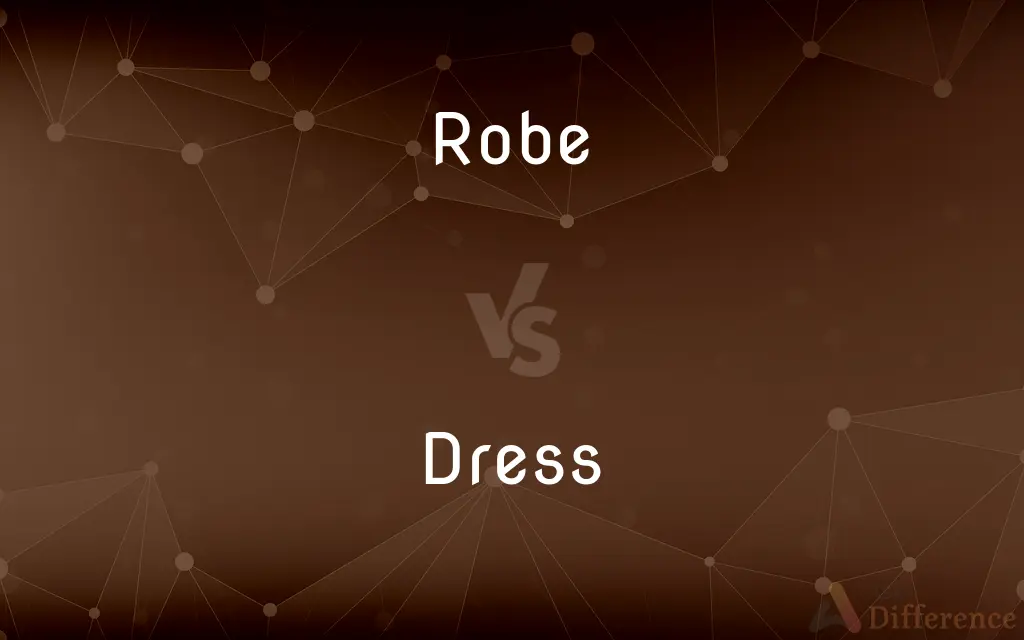Robe vs. Dress — What's the Difference?
By Tayyaba Rehman — Updated on September 19, 2023
A Robe is a loose-fitting garment often worn for lounging or rituals, while a Dress is a one-piece garment typically worn by women for various occasions. Both are clothing items but serve different purposes.

Difference Between Robe and Dress
Table of Contents
ADVERTISEMENT
Key Differences
Clothing is an expression of culture, occasion, and personal style. Within this broad spectrum, the Robe and Dress stand as distinct garments, each with its unique characteristics and uses.
A Robe, in its essence, signifies comfort, ritual, or authority. Often loose and flowing, Robes are typically worn at home, during specific ceremonies, or by certain professionals like judges. These garments prioritize comfort and can be worn over other clothing.
In contrast, a Dress is a staple in women's fashion. Designed as a single piece, Dresses come in a myriad of styles, lengths, and materials, suitable for everyday wear, work, or special occasions. They are form-fitting to varying degrees and accentuate the body's shape.
Moreover, while the primary function of a Robe may be relaxation or signifying a particular status, a Dress is more versatile, often chosen based on fashion trends, the season, or the occasion.
So, whether one reaches for a Robe or a Dress, the choice often reflects not just a clothing preference but the activity, event, or role they are preparing for.
ADVERTISEMENT
Comparison Chart
Purpose
Often for comfort, rituals, or authority.
Typically for fashion, everyday wear, or special occasions.
Fit
Generally loose-fitting.
Can range from loose to form-fitting.
Worn Over
Can be worn over other clothing.
Typically worn alone or with layers underneath.
Common Users
Both genders; also used by professionals like judges.
Primarily women, but also includes certain men's attire.
Occasion
Leisure, ceremonies, professional roles.
Casual, work, parties, formal events.
Compare with Definitions
Robe
A robe is a loose-fitting outer garment. Unlike garments described as capes or cloaks, robes usually have sleeves.
Dress
A one-piece garment for women or girls.
She wore a red Dress to the party.
Robe
A long, loose outer garment reaching to the ankles
A baby in christening robes
A young man in a fez and ragged robe
Dress
A dress (also known as a frock or a gown) is a garment traditionally worn by women or girls consisting of a skirt with an attached bodice (or a matching bodice giving the effect of a one-piece garment). It consists of a top piece that covers the torso and hangs down over the legs.
Robe
Short for lap robe
Dress
Put on one's clothes
Graham showered and dressed quickly
I'll go and get dressed
Robe
Clothe in a robe
A circle of robed figures
A white-robed Bedouin
Dress
Decorate (something) in an artistic or attractive way
She'd enjoyed dressing the tree when the children were little
Robe
Often robes An official garment worn on formal occasions to show office or rank, as by a judge or high church official.
Dress
Treat or prepare (something) in a certain way.
Robe
An academic gown.
Dress
Draw up (troops) in the proper alignment.
Robe
A dressing gown or bathrobe.
Dress
(of a man) have the genitals habitually on one or the other side of the fork of the trousers
Do you dress to the left?
Robe
Robes Clothes; apparel.
Dress
Make (an artificial fly) for use in fishing
After you dress a dry fly, be sure to remove any oil before you make your next cast
Robe
A blanket or covering made of material, such as fur or cloth
A lap robe.
Dress
A one-piece garment for a woman or girl that covers the body and extends down over the legs
A dress designer
A white cotton dress
Robe
To cover or dress in a robe or in something that functions like a robe
Fields that were robed with snow.
Dress
Clothing of a specified kind for men or women
Traditional African dress
Robe
To put on a robe or robes.
Dress
To put clothes on; clothe.
Robe
A long loose outer garment, often signifying honorary stature.
Dress
To furnish with clothing.
Robe
(US) The skin of an animal, especially the bison, dressed with the fur on, and used as a wrap.
Dress
To decorate or adorn
Dress a Christmas tree.
Robe
A wardrobe, especially one built into a bedroom.
Dress
To garnish
Dressed the side dish with parsley.
Robe
The largest and strongest tobacco leaves.
Dress
To arrange a display in
Dress a store window.
Robe
(transitive) To clothe; to dress.
Dress
To arrange (troops) in ranks; align.
Robe
(intransitive) To put on official vestments.
Dress
To apply medication, bandages, or other therapeutic materials to (a wound).
Robe
An outer garment; a dress of a rich, flowing, and elegant style or make; hence, a dress of state, rank, office, or the like.
Through tattered clothes small vices do appear;Robes and furred gowns hide all.
Dress
To arrange and groom (the hair), as by styling, combing, or washing.
Robe
A skin of an animal, especially, a skin of the bison, dressed with the fur on, and used as a wrap.
Dress
To groom (an animal); curry.
Robe
To invest with a robe or robes; to dress; to array; as, fields robed with green.
The sage Chaldeans robed in white appeared.
Such was his power over the expression of his countenance, that he could in an instant shake off the sternness of winter, and robe it in the brightest smiles of spring.
Dress
To fertilize (land or plants).
Robe
Any loose flowing garment
Dress
(Archaic) To cultivate (land or plants).
Robe
Outerwear consisting of a long flowing garment used for official or ceremonial occasions
Dress
To clean (fish or fowl) for cooking or sale.
Robe
Clothe formally; especially in ecclesiastical robes
Dress
To put a finish on (stone or wood, for example).
Dress
To tan or prepare (a hide) in leather-making.
Dress
To put on clothes.
Dress
To wear clothes of a certain kind or style
Dresses casually.
Dress
To wear formal clothes
Dress for dinner.
Dress
To get into proper alignment with others
The troops dressed on the squad leader.
Dress
Clothing; apparel.
Dress
A style of clothing
Folk dancers in peasant dress.
Dress
A one-piece outer garment consisting of a skirt and bodice.
Dress
Outer covering or appearance; guise
An ancient ritual in modern dress.
Dress
Suitable for formal occasions
Dress shoes.
Dress
Requiring formal clothes
A dress dinner.
Dress
(transitive)
Dress
To put clothes (or, formerly, armour) on (oneself or someone, a doll, a mannequin, etc.); to clothe.
He was dressed in the latest fashions.
Dress
To design, make, provide, or select clothes (for someone).
The fashion designer was proud to have dressed the queen for the charity event.
Dress
To arrange or style (someone's hair).
Dress
To adorn or ornament (something).
It was time to dress the windows for Christmas again.
Dress
To apply a dressing to or otherwise treat (a wound); (obsolete) to give (a wounded person) medical aid.
Dress
To fit or prepare (something) for use; to render (something) suitable for an intended purpose; to get ready.
In mining and metallurgy, to dress ores by sorting and separating them
Dress
To cultivate or tend to (a garden, land, plants, etc.); especially, to add fertilizer or manure to (soil); to fertilize, to manure.
Dress
To cut up (an animal or its flesh) for food; specifically (hunting), to remove the internal organs (of a game animal) shortly after it has been killed so that the carcass cools more quickly; to field dress.
Dress
(cooking) To prepare (food) for cooking or eating, especially by seasoning it; specifically, to add a dressing or sauce (to food, especially a salad).
Dress
(military) To arrange (soldiers or troops) into proper formation; especially, to adjust (soldiers or troops) into straight lines and at a proper distance from each other; to align.
To dress the ranks
Dress
To treat (someone) in a particular manner; specifically, in an appropriate or fitting manner; to give (someone) a deserved beating; also, to give (someone) a good scolding; to dress down.
Dress
(obsolete) To break in and train (a horse or other animal) for use.
Dress
To prepare (oneself); to make ready.
Dress
(intransitive)
Dress
To put on clothes.
Get dressed
I rose and dressed before daybreak.
It’s very cold out. Dress warm.
Dress
Of a thing: to attain a certain condition after undergoing some process or treatment to fit or prepare it for use.
Dress
To allow one's penis to fall to one side or the other within one's trousers.
While measuring him for his trousers, the tailor asked him if he dressed to the left or the right.
Dress
(slang) cross-dress
Dress
Of an animal carcass: to have a certain quantity or weight after removal of the internal organs and skin; also, to have a certain appearance after being cut up and prepared for cooking.
Dress
Of soldiers or troops: to arrange into proper formation; especially, to form into straight lines and at a proper distance from each other.
Dress
(sports) Of a sportsperson: to put on the uniform and have the equipment needed to play a sport.
Due to a left ankle sprain, the basketball player did not dress for the game against Indiana.
Dress
(countable)
Dress
An item of clothing (usually worn by a woman or young girl) which both covers the upper part of the body and includes a skirt below the waist.
Amy and Mary looked very pretty in their dresses.
Dress
(archaic) An item of outer clothing or set of such clothes (worn by people of all sexes) which is generally decorative and appropriate for a particular occasion, profession, etc.
Dress
Ellipsis of dress rehearsal
Dress
(uncountable)
Dress
Apparel or clothing, especially when appropriate for a particular occasion, profession, etc.
Military dress
He came to the party in formal dress.
Dress
(archaic) The act of putting on clothes, especially fashionable ones, or for a particular (especially formal) occasion.
Dress
(by extension)
Dress
(obsolete) The act of applying a dressing to or otherwise treating a wound; also, the dressing so applied.
Dress
To direct; to put right or straight; to regulate; to order.
At all times thou shalt bless God and pray Him to dress thy ways.
To Grisild again will I me dresse.
Dress
To arrange in exact continuity of line, as soldiers; commonly to adjust to a straight line and at proper distance; to align; as, to dress the ranks.
Dress
To treat methodically with remedies, bandages, or curative appliances, as a sore, an ulcer, a wound, or a wounded or diseased part.
Dress
To adjust; to put in good order; to arrange; specifically: (a) To prepare for use; to fit for any use; to render suitable for an intended purpose; to get ready; as, to dress a slain animal; to dress meat; to dress leather or cloth; to dress or trim a lamp; to dress a garden; to dress a horse, by currying and rubbing; to dress grain, by cleansing it; in mining and metallurgy, to dress ores, by sorting and separating them.
And the Lord God took the man, and put him into the garden of Eden to dress it.
When he dresseth the lamps he shall burn incense.
Three hundred horses . . . smoothly dressed.
Dressing their hair with the white sea flower.
If he felt obliged to expostulate, he might have dressed his censures in a kinder form.
Dress
To cut to proper dimensions, or give proper shape to, as to a tool by hammering; also, to smooth or finish.
Dress
To put in proper condition by appareling, as the body; to put clothes upon; to apparel; to invest with garments or rich decorations; to clothe; to deck.
Dressed myself in such humility.
Prove that ever Idress myself handsome till thy return.
Dress
To break and train for use, as a horse or other animal.
Dress
To arrange one's self in due position in a line of soldiers; - the word of command to form alignment in ranks; as, Dress right, dress!
Dress
To clothe or apparel one's self; to put on one's garments; to pay particular regard to dress; as, to dress quickly.
To flaunt, to dress, to dance, to thrum.
Dress
That which is used as the covering or ornament of the body; clothes; garments; habit; apparel.
Dress
A lady's gown; as, silk or a velvet dress.
Dress
Attention to apparel, or skill in adjusting it.
Men of pleasure, dress, and gallantry.
Dress
The system of furrows on the face of a millstone.
Dress
A one-piece garment for a woman; has skirt and bodice
Dress
Clothing of a distinctive style or for a particular occasion;
Formal attire
Battle dress
Dress
Clothing in general;
She was refined in her choice of apparel
He always bought his clothes at the same store
Fastidious about his dress
Dress
Put on clothes;
We had to dress quickly
Dress the patient
Can the child dress by herself?
Dress
Provide with clothes or put clothes on;
Parents must feed and dress their child
Dress
Put a finish on;
Dress the surface smooth
Dress
Dress in a certain manner;
She dresses in the latest Paris fashion
He dressed up in a suit and tie
Dress
Dress or groom with elaborate care;
She likes to dress when going to the opera
Dress
Kill and prepare for market or consumption;
Dress a turkey
Dress
Arrange in ranks;
Dress troops
Dress
Decorate (food), as with parsley or other ornamental foods
Dress
Provide with decoration;
Dress the windows
Dress
Put a dressing on;
Dress the salads
Dress
Cultivate, tend, and cut back the growth of;
Dress the plants in the garden
Dress
Cut down rough-hewn (lumber) to standard thickness and width
Dress
Convert into leather;
Dress the tanned skins
Dress
Apply a bandage or medication to;
Dress the victim's wounds
Dress
Give a neat appearance to;
Groom the dogs
Dress the horses
Dress
Arrange attractively;
Dress my hair for the wedding
Dress
Suitable for formal occasions;
Formal wear
A full-dress uniform
Dress shoes
Dress
(of an occasion) requiring formal clothes;
A dress dinner
A full-dress ceremony
Dress
Clothing suitable for a particular occasion.
He was in Dress uniform for the parade.
Dress
An outer garment, especially for women.
She had a Dress for every event.
Dress
The act of wearing clothing.
She made a Dress out of the available fabric.
Dress
A garment for special occasions.
The bride's Dress was stunning.
Common Curiosities
Why do professionals like judges wear Robes?
Robes symbolize authority, neutrality, and tradition in professions like the judiciary.
Are Robe and Dress interchangeable terms?
No, while both are garments, a Robe is typically loose and used for lounging or ceremonies, whereas a Dress is a one-piece outfit primarily for women.
Can a Robe be worn outside?
While Robes are typically indoor garments, some styles, like those for ceremonies or academic processions, are worn outside.
Is a bathrobe the same as a regular Robe?
A bathrobe is a type of Robe made from absorbent materials, designed to be worn after bathing.
Can men wear a Dress?
While Dresses are typically associated with women, there are cultures and fashions where men do wear garment styles considered to be Dresses.
Is a Dress always formal?
No, Dresses can range from casual to formal, depending on the design and occasion.
Can a Dress be worn with pants?
Yes, in some styles and cultures, Dresses are layered over pants or leggings.
Are cocktail Dresses formal?
Cocktail Dresses are considered semi-formal, suitable for evening events but less formal than a ballgown.
How is a sundress different from a regular Dress?
A sundress is a type of lightweight Dress typically worn in warm weather, often sleeveless and with a wide neckline.
Do all Robes come with a belt?
Not all, but many Robes have belts or sashes to secure them around the waist.
How do you distinguish a Dress from a skirt?
A Dress is a one-piece garment covering the body and possibly legs, while a skirt is only the lower part and needs a top to complete the outfit.
Can Robes be decorative?
Yes, some Robes, especially ceremonial ones, can be highly decorative and ornate.
Why might someone wear a Robe in a spa?
Robes in spas provide comfort, modesty, and warmth between treatments.
Is a Dress typically longer than a skirt?
Not necessarily; both Dresses and skirts can vary in length from mini to maxi.
Do Robes have cultural significance?
Yes, in many cultures, Robes hold religious, ceremonial, or traditional significance.
Share Your Discovery

Previous Comparison
History vs. Background
Next Comparison
Get vs. GainAuthor Spotlight
Written by
Tayyaba RehmanTayyaba Rehman is a distinguished writer, currently serving as a primary contributor to askdifference.com. As a researcher in semantics and etymology, Tayyaba's passion for the complexity of languages and their distinctions has found a perfect home on the platform. Tayyaba delves into the intricacies of language, distinguishing between commonly confused words and phrases, thereby providing clarity for readers worldwide.














































